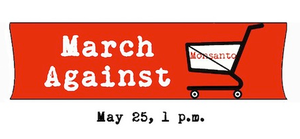
The march and rally, part of an international day of protests, will begin at 1 p.m. on the University of Michigan Diag and end at Hanover Square Park on Packard Road. Organizer Kryssi Jones said the event will focus on spreading the word about the dangers of genetically modified foods, commonly referred to as GMOs (which stands for Genetically Modified Organisms).
“It’s not as much against Monsanto as it is about education,” she said. “We really want people to know about the issue and that’s the main focus.”
Monsanto says its genetically modified seeds and feeds are held to a rigorous safety standard and are just as safe as non-modified crops.

The rally in Hanover Square Park will include speakers who work on GMO-free farms and plenty of literature distribution. There will also be children’s activities focused on teaching kids about what organizers say are the dangers of genetically modified foods.
“We’ll be helping to make people aware of not just what GMOs are, but what people can do to help the situation,” Jones said.
“We will encourage people to vote with their dollars, and we’ll be passing out lists of brands that have GMOs or are owned by Monsanto for people to avoid. We’re also going to be informing people about local farmers markets and different venues where they can get non-GMO foods.”
Besides advocating for a boycott of genetically modified foods, the march is designed to encourage attendees to take a more active role in the political process to help counter-balance what she says is an outsized influence held by major corporations like Monsanto.
“The senate just voted yesterday and struck down labeling of GMO products; we’re pretty upset about that and it’s adding to our momentum.” she said.
“We want people to email their legislators or send them a postcard, we’re trying to give them ideas on how to approach their lawmakers with these issues.”
Other marches will be held in 10 Michigan cities, including Detroit, Grand Rapids, Lansing and Traverse City. Across the globe, 330 marches are planned in more than 40 countries.
“This is really an international issue,” Jones said. “Other countries have actually banned Monsanto from operating or being in their countries. It’s not just a bunch of hippies who don’t like it, it’s a global thing.”
Jones has been an “active protester” for about seven years and was one of the organizers behind the Occupy Portland efforts in the fall of 2011. She said that marchers are encouraged to stay on the sidewalks during the group’s 1-mile march, but she wouldn’t’ be surprised if things spill over on occasion.
“People here don’t want to march on the sidewalks,” she said.
“They want to practice some civil disobedience. I am encouraging people to march on the sidewalks so that we don’t have negative experiences with the police or attract any negative attention.”
Monsanto did not respond to requests to comment on this story.
Ben Freed covers business for AnnArbor.com. You can sign up here to receive Business Review updates every week. Reach out to Ben at 734-623-2528 or email him at benfreed@annarbor.com. Follow him on twitter @BFreedinA2.